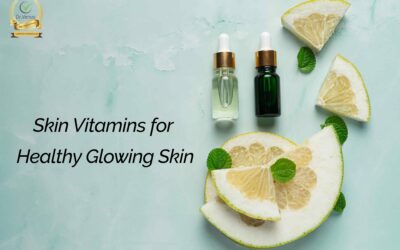Regarding skincare, our focus is usually on external factors like cleansing and moisturizing, toning, etc. Like the other organs in your body, the skin, too, is affected by your health internally.
Vitamins are crucial in cell renewal and DNA damage repair, using various nutrients and boosting the immune system. So, if you find that your body is deficient in these vital nutrients, it could manifest on your skin in the form of wrinkles, dehydration, or, even worse, infections.
Maintaining your skin is an integral part of your routine. It is, after all, the largest and most important organ in your body.
The first thing that health experts will tell you to do to maintain your skin’s health is to reduce your exposure to UV harmful sun (UV) radiation and to wear sunscreen that protects you from exposure to the sun’s rays. But sun exposure isn’t always toxic for you. A few minutes of everyday exposure can help produce vitamin D in the skin.
Highlights
10 Reasons to Take Skin Vitamins For Healthy Glowing Skin
- Cell growth is promoted-Skin cell regeneration.
- Locks moisture- Vitamin supplements offer internal nourishment. Each cell stores and locks in water, bringing the appearance of a radiant and dewy luminosity to the face.
- Skin dullness is reduced- Our skin gets dull, dark, and pigmented each time we go out! Skin vitamins are a source of internal nutrition and a healing process that balances the effects.
- Reduces hyperpigmentation
- Brightens the skin tone
- Nourishes skin cells
- Improves skin texture
- Enhances radiance
- Maintains skin elasticity
- Uplifts skin quality- Skin health can be the outcome of the proper diet, vitamin intake, and routine for skincare.
Vitamins Good For Skin Beauty:
Vitamin D is among the best vitamins for your skin, as are the vitamins A, D, C, E, and K.
Getting enough vitamins can help keep your skin looking young and healthy. This could lead to a reduction in
- Dark spots
- Redness
- Wrinkles
- rough patches
- excessive dryness
Essential skin vitamins are readily available in supplements but can also be found in skincare products. Please find out more about these four vital vitamins and how they assist you in maintaining optimal skin health.
Benefits Of Vitamins For Your Skin
VITAMIN A
Vitamin-A, this fat-soluble vitamin, can often be discovered in beta-carotene, which is found in food items and supplements. It is a potent antioxidant and is among the most popular components in sunscreens, anti-aging serums, moisturizers, and many more. Vitamin A does more than help you maintain healthy, hydrated skin, but it also helps combat skin problems like acne.
Benefits
- It helps promote cell growth and renewal that rejuvenates your face’s upper and lower layers (dermis and epidermis).
- Increases collagen production, which smoothens the skin while reducing wrinkles and lines.
- It minimizes the harm caused by the harmful UV rays from the sun.
- Stimulates the sebaceous glands of your skin, causing them to release oil and keep your skin moisturized.
- It helps speed up wound healing and improves the natural skin’s immune system.
A healthy adult should consume 700mcg for males and 900mcg for women daily.
Foods containing Vitamin A
- Yellow or orange vegetables and fruits like pumpkins, carrots, bell peppers in yellow, oranges, papaya, mangoes, and many more.
- Green leafy vegetables like broccoli, spinach, and so on.
- Cod liver oil, eggs, meat liver, eggs, etc.
- Fortified milk and other dairy products such as Ice cream, cheese, etc.
Vitamin D
Vitamin D is typically produced when the skin absorbs sunlight. Cholesterol is converted into vitamin D after this happens. Vitamin D can then be absorbed by the kidneys and your liver and distributed throughout your body to assist in the formation of healthy cells. This includes your skin, in which vitamin D plays an essential role in your skin tone. It can also help in treating psoriasis. Calcitriol is a synthetic variant of vitamin D produced by humans naturally.
It is possible to increase the amount of vitamin D in your diet by:
- Having 10 minutes of exposure to the sun every each day (check with your physician before doing this, especially if you have a prior history of skin cancer)
- I eat fortified foods, including fruit juice, breakfast cereals, and yogurt.
- I eat food items containing natural vitamin D, like tuna, salmon, and cod.
Vitamin C
Vitamin C is present in significant levels within the epidermis (outer layer of the skin) and the dermis (inner layer of the skin). Its anti-cancer (antioxidant) properties and its function in collagen production maintain your skin’s health. This is why vitamin C is among the main ingredients used in various anti-aging skincare products.
Consuming vitamin C in capsules can boost the efficacy of sunscreens that are applied to your skin to shield it from harmful UV Rays. It accomplishes this by reducing damage to cells and aiding in the healing process of wounds that have been caused by bodily injury. Vitamin C helps fight wrinkles because it is crucial in the body’s natural collagen production. It aids in healing injured skin and also, in certain instances, helps reduce wrinkles. Vitamin C consumption that is adequate helps to repair and avoid dry skin.
Because of the abundance of vitamin C in over-the-counter products, nutritional supplements, and the foods we consume, the deficiency of this vitamin is extremely rare.
The recommended dosage is 1000 mg per day. If you feel that you’re not getting enough vitamin C from your diet, then you should:
- Consume more citrus fruits like oranges, sweet lime, etc
- Eat other plants that are rich in vitamin C, like broccoli, strawberries, and spinach
- Consume orange juice
- Take supplements as directed by a physician
Look for skincare products that contain vitamin C to treat wrinkles, dryness, redness, and age spots.
Vitamin E
As vitamin C is considered an antioxidant, the same goes with vitamin E. Its primary role in skincare is to guard against sun-induced damage. Vitamin E absorbs harmful UV radiation from the sun when applied to the skin. Photoprotection refers to the body’s ability to reduce the harm caused by UV rays. This helps to prevent wrinkles and dark spots.
In normal circumstances, the body produces vitamin E by producing sebum, an oily substance released through the skin’s pores. If balanced, sebum is a good thing to keep the skin moisturized and reduces dryness. If you suffer from oily skin, vitamin E may be able to help combat a deficiency of sebum. Vitamin E can also aid in treating skin inflammation. While vitamin E can be found in numerous skin products for skin care, the issue is that the effects may be diminished by exposure to sunlight.
Making sure you get enough vitamin E in your diet is recommended. Adults require about fifteen mg of vitamin E each day. It is possible to increase the amount by:
- Snacking on more significant portions of nuts and seeds like hazelnuts, almonds, and sunflower seeds
- Having a multivitamin as well as additional vitamin E supplement
Applying topical products that contain vitamin E as well as vitamin C (this could be more effective at protecting against photosensitivity than products that only have one of them)
Vitamin K
Vitamin K is vital in helping to facilitate the procedure of blood clotting, which assists in the healing of bruises, cuts, and other areas that are affected by surgical procedures. Vitamin K is believed to aid in treating certain skin conditions like:
- stretch marks
- spider veins
- Scars
- Dark spots
- stubborn circles under your eyes
Vitamin K is found in numerous creams for the skin, and it is an excellent treatment for many skin issues. Most dermatologists apply creams containing vitamin K to treat patients who’ve recently undergone surgery to reduce swelling and bruises. This can accelerate the healing process of the skin. However, research into vitamin K’s effects on the skin is less extensive than the effects of vitamins E and C.
Adults require between 90-120 ug per day. It is possible to increase the amount by eating:
- Kale
- Spinach
- Lettuce
- Cabbage
- green beans
Vitamins are crucial for the health of your skin.

Vitamins Good For Skin Whitening:
Vitamin C
Vitamin C assists in whitening by priming the skin cells in a way that makes them vulnerable to the effects of Glutathione. Furthermore, research indicates the possibility that vitamin C itself may possess some brightening and whitening properties.
The natural skin tone is the first thing to do is determine the skin color you are born with. This isn’t changing. As time passes as a result of prolonged exposure to the sun, and as the aging process begins, the skin’s pressure is due to various reasons. When exposed to the sun, there are issues such as increased melanin production on the skin, leading to the skin becoming darker than its natural color. Aging can also lead to the skin turning many shades lighter. Dark spots, dark spots, wrinkles, and uneven skin tone all contribute to the appearance of skin dull and, in a few instances, darker.
The positive side is that there are methods to fight the over-exerts of nature. While getting fair isn’t the case, ensuring your skin is protected from free radicals and, thus, having radiant skin is achievable. The techniques to achieve these results are numerous, including applying creams and lotions specially created for this goal. However, some supplements in the markets can help you tackle the issues.
Vitamin supplements are readily available these days, so talk with your dermatologist or physician to establish a plan to improve your well-being. The next time you are in the aisle for skin care in the pharmacy, check that these vitamins are in your most loved products.
Vitamins are vital for healthy skin, and you may be receiving enough of these nutrients in your daily food. A blood test will help identify if you suffer from vitamin deficiency. It is recommended to take vitamins under the supervision of a physician to avoid an overdose.
